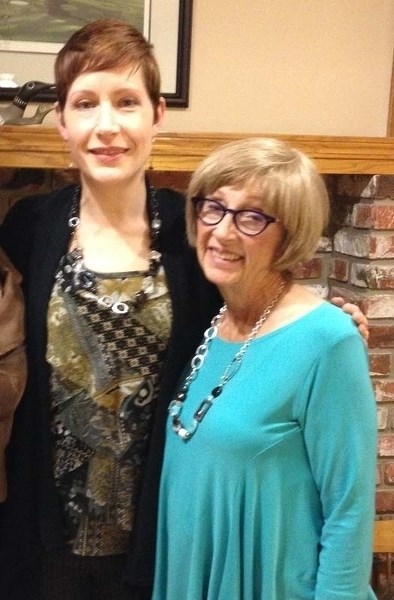Three days before the birth of her daughter in January 2013, Elisa Warwick-Markowski discovered a lump on her breast.
Three days before the birth of her daughter in January 2013, Elisa Warwick-Markowski discovered a lump on her breast. The lump was quickly diagnosed as cancerous, but the shock and the terrors were only just beginning because that same month her mother Elaine Warwick was diagnosed with ovarian cancer.
“We were both going to the Charles Cross Cancer Clinic at the same time. We started chemo together in March,” Warwick-Markowski said, adding that she felt as if she had been blindsided.
“To be diagnosed with cancer at age 34, just three days before my baby was due and then to have my mother diagnosed with cancer at the same time and then to find out it was a very aggressive cancer was unbelievable. How could it even be true?” she asked.
Soon after the initial diagnosis an oncologist at the Cross Cancer Clinic suggested that there could be a genetic link between the two cancers. Previously Elaine's sister had breast cancer and there was a history of early deaths among family members on her father's side.
Elaine, who still lives in the St. Albert home where her daughters grew up, explained that a number of her father's sisters, who lived in a small village in Greece, likely had cancer.
“There were stories that they had stomach troubles. I believe now they likely had cancer,” Elaine said.
The genetic testing is a simple blood sample, but it is complicated to study the DNA and there is a long waiting list that in some cases takes up to three years. Because of the shared cancer diagnosis, Warwick-Markowski and her mother had the blood test in June 2013.
“They discovered that on Chromosome 17, we shared a gene mutation. If you have that gene mutation, the lifetime risk for getting breast cancer as high as 87 per cent before the age of 70,” Warwick-Markowski said.
That knowledge set off a whirlwind of emotions among members of the Warwick family. Elaine has four daughters and since then, two of them have been tested. Though only Elisa had cancer, one of her sisters has the same BRCA 1 genetic mutation and is also in a process of constant monitoring and testing.
There are huge risks even to having the test done. If the test proves that you are a mutated-gene carrier, many insurance companies will deny coverage. From an emotional point of view, news that you have that genetic mutation can be devastating, since you must decide whether or not you wish to have children or to breast feed. You must balance that with the overwhelming odds that this genetic cancer strikes young and when it does, it is very aggressive.
“If you have already had cancer, there is still a lifetime risk after treatment of a reoccurrence. If you have surgery before you get cancer, and remove all your lady parts, including a double mastectomy and a total hysterectomy, you reduce your risk of cancer by between 90 and 95 per cent,” Warwick-Markowski said.
HBOC Society
Since their genetic testing began the Warwicks have been supported by the Hereditary Breast and Ovarian Cancer Society (HBOC) and the Allard Hereditary Breast and Ovarian Cancer clinic, located in the Lois Hole Hospital for Women. The Allard Hereditary Breast and Ovarian Cancer Clinic does not test people for genetic markers.
The mandate of the HBOC Society is to provide awareness, research, services and education. They only deal with clients who have already been diagnosed with a genetic mutation or have a close family member that has a marker. Testing is done at the U of A and you must be referred by a physician or an oncologist. The clinic supports clients who have been referred on the basis of a genetic mutation. 16 new patients are referred each month.
Two weeks ago $600,000 was raised at a Royal Alexandra Hospital Foundation and HBOC Society hosted fundraiser at the Enjoy Centre in St. Albert. Those funds will be used to expand the services offered at the Allard clinic. There is no other clinic like it in Alberta.
“It's estimated that one in 400 people have that genetic mutation and people come to this clinic from all over Alberta. Yet there is very little money for research into the genetics,” said HBOC chairperson, Mary McDonald.
The only fundraising that supports this clinic and the effects of this genetic cancer is through the Hereditary Breast and Ovarian Cancer Society.
“The public presumes that the larger Canadian Breast Cancer Society supports the research into hereditary cancer. That is not so at present. About five to 10 per cent of all breast cancers are hereditary, but that's still about 10,000 people in Alberta. If you want your dollars to go to hereditary breast, ovarian and prostate cancer research and services, then the HBOC Society is the place where you must donate,” McDonald said.
For now the news on the health of the Warwick family is mixed. Elisa Warwick-Markowski has two beautiful, healthy children and she is back to work as a pharmaceutical representative for Merck Canada. She is on the waiting list for a cancer-preventive double mastectomy. Last week Elaine Warwick began yet another round of chemotherapy.
“I wish there was more awareness. We had no clue about the genetic connection. I wish there was more awareness among doctors and education for patients,” Elaine added.
